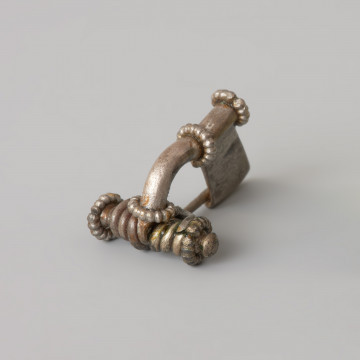
Tortoiseshell buckle
National Museum in Szczecin
Part of the collection: Antiquity
The brooch, known also as fibula, was used to fasten clothes or neck-rings with amber or glass beads. It was found in an urned cremation discovered around 200 meters from Miedwie Lake, on the southern edge of the village of Piaśnica. According to data preserved in the pre-war archives, the burial was originally furnished with three fibulae, of which two identical ones have survived to the present day. Fibulae are a very diverse group of ornaments. They can be divided into a number of variants distinguished on the basis of differences in design, decorations or metal from which they are made. Fibulae of a particular variant were used at a specific time, which is why they are good “daters” for assemblages of finds, such as graves. The presented brooch represents an early form of fibulae from the beginning of the 1st century, imported to Pomerania from the Roman provinces, from the area of Noricum and Pannonia. They were commonly used in the Oder and Vistula river basins until the middle of the first century. Some researchers speculate that the iron specimens may have been made locally as imitations of the bronze prototypes. The fibulae from the Miedwie Lake region were described in the pre-war inventory book as “Giese’s gift”. Also, in the Archives of the Archaeology Department of the National Museum in Szczecin, there are letters from October 1898 and July 1899 written by a teacher named Gebhardt, in which he reported the finds of fibulae and a bronze bracelet. Initially, all these ornaments were in his private collection. In March 1900, Gebhardt sold some of them to the Museum in Szczecin for the total sum of 5 Marks.
Bartłomiej Rogalski
Author / creator
Dimensions
cały obiekt: height: 2.3 cm, width: 6.2 cm
Object type
pin (fastener)
Technique
casting
Material
bronze
Creation / finding place
Owner
Muzeum Narodowe w Szczecinie
Identification number
Location / status